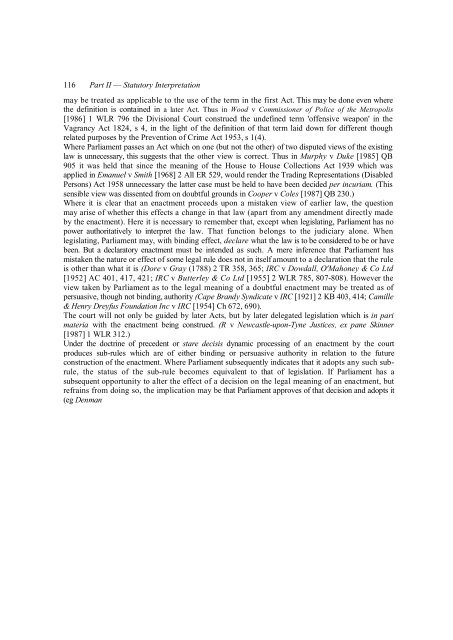Statutory Interpretation The Technique of Statutory ... - Francis Bennion
Statutory Interpretation The Technique of Statutory ... - Francis Bennion
Statutory Interpretation The Technique of Statutory ... - Francis Bennion
You also want an ePaper? Increase the reach of your titles
YUMPU automatically turns print PDFs into web optimized ePapers that Google loves.
116 Part II — <strong>Statutory</strong> <strong>Interpretation</strong><br />
may be treated as applicable to the use <strong>of</strong> the term in the first Act. This may be done even where<br />
the definition is contained in a later Act. Thus in Wood v Commissioner <strong>of</strong> Police <strong>of</strong> the Metropolis<br />
[1986] 1 WLR 796 the Divisional Court construed the undefined term '<strong>of</strong>fensive weapon' in the<br />
Vagrancy Act 1824, s 4, in the light <strong>of</strong> the definition <strong>of</strong> that term laid down for different though<br />
related purposes by the Prevention <strong>of</strong> Crime Act 1953, s 1(4).<br />
Where Parliament passes an Act which on one (but not the other) <strong>of</strong> two disputed views <strong>of</strong> the existing<br />
law is unnecessary, this suggests that the other view is correct. Thus in Murphy v Duke [1985] QB<br />
905 it was held that since the meaning <strong>of</strong> the House to House Collections Act 1939 which was<br />
applied in Emanuel v Smith [1968] 2 All ER 529, would render the Trading Representations (Disabled<br />
Persons) Act 1958 unnecessary the latter case must be held to have been decided per incuriam. (This<br />
sensible view was dissented from on doubtful grounds in Cooper v Coles [1987] QB 230.)<br />
Where it is clear that an enactment proceeds upon a mistaken view <strong>of</strong> earlier law, the question<br />
may arise <strong>of</strong> whether this effects a change in that law (apart from any amendment directly made<br />
by the enactment). Here it is necessary to remember that, except when legislating, Parliament has no<br />
power authoritatively to interpret the law. That function belongs to the judiciary alone. When<br />
legislating, Parliament may, with binding effect, declare what the law is to be considered to be or have<br />
been. But a declaratory enactment must be intended as such. A mere inference that Parliament has<br />
mistaken the nature or effect <strong>of</strong> some legal rule does not in itself amount to a declaration that the rule<br />
is other than what it is (Dore v Gray (1788) 2 TR 358, 365; IRC v Dowdall, O'Mahoney & Co Ltd<br />
[1952] AC 401, 417, 421; IRC v Butterley & Co Ltd [1955] 2 WLR 785, 807-808). However the<br />
view taken by Parliament as to the legal meaning <strong>of</strong> a doubtful enactment may be treated as <strong>of</strong><br />
persuasive, though not binding, authority (Cape Brandy Syndicate v IRC [1921] 2 KB 403, 414; Camille<br />
& Henry Dreyfus Foundation Inc v IRC [1954] Ch 672, 690).<br />
<strong>The</strong> court will not only be guided by later Acts, but by later delegated legislation which is in pari<br />
materia with the enactment being construed. (R v Newcastle-upon-Tyne Justices, ex pane Skinner<br />
[1987] 1 WLR 312.)<br />
Under the doctrine <strong>of</strong> precedent or stare decisis dynamic processing <strong>of</strong> an enactment by the court<br />
produces sub-rules which are <strong>of</strong> either binding or persuasive authority in relation to the future<br />
construction <strong>of</strong> the enactment. Where Parliament subsequently indicates that it adopts any such subrule,<br />
the status <strong>of</strong> the sub-rule becomes equivalent to that <strong>of</strong> legislation. If Parliament has a<br />
subsequent opportunity to alter the effect <strong>of</strong> a decision on the legal meaning <strong>of</strong> an enactment, but<br />
refrains from doing so, the implication may be that Parliament approves <strong>of</strong> that decision and adopts it<br />
(eg Denman

















